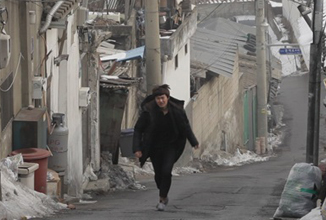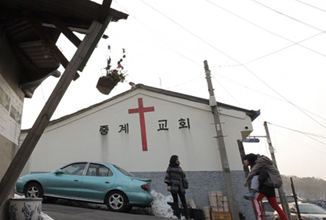"Woo-suk works so he can buy his father food and drink, but you do f*ck all...
Get out there, get a f*cking job and bring me home some f*cking soju!"
Synopsis:
Buk-seong, Young-rim and Woo-suk are friends living (or, more accurately, barely existing) in close proximity in a rundown, poverty stricken shanty town near to, but totally separate from and utterly ignored by, a neon-lit metropolis. Each is a school dropout coming from a broken home - Buk-seong having to deal on a minute-by-minute basis with his drunken, violent father and his mentally handicapped brother; Young-rim constantly trying to stop his destitute mother from sifting through neighbourhood garbage to find cardboard and Soju bottles she can sell for a few pennies; Woo-suk taking any part-time job to feed his family and pinning his entire hopes for a brighter future on his brother returning from the military; and all being fully aware that their female friend Han-soo is at the mercy of a fanatically religious mother who thinks that allowing the local church pastor to sexually abuse her daughter will somehow bring her closer to God - with their biting poverty being both cause and effect of not only their familial dysfunction but also their inherently bleak and seemingly hopeless situations and outlooks.
Into their midst steps a stranger with a video camera who starts filming the three friends and asking about their lives; problems; and feelings about South Korea in general, and though some of his probing questions lead Buk-seong especially to believe he may well be a North Korean spy, the young men have too many other far more immediate, pertinent and personal issues to deal with to pay the possibility any real mind or even begin to try to ascertain the man's motivation.
However, the true agenda of this camera wielding interloper not only involves Buk-seong, Young-rim and Woo-suk more deeply than they realise but will also ultimately lead them, both psychologically and physically, to a place they could never have imagined...
Review:
Over the years, tales of espionage, political intrigue and subterfuge have been fairly prevalent in Korean cinema; the pitting of North and South Korean operatives and/or spies against each other deftly serving to underline the ongoing tensions between the two countries while ensuring narrative topicality, in the process. Korean writers and filmmakers have regularly used such stories to contrast their perceptions of North Korea's regime with their feelings regarding the political and governmental system of the South - both in an overall sense and in relation to individuals within each - and, as such, there are numerous examples of South Korean espionage thrillers detailing initially loyal (often fanatically so) North Korean operatives ultimately being brought face-to-face with a stark choice between their country's expectations and demands and their own needs and desires (their search for humanity, if you will) not only setting them in opposition to the ideals of North Korea itself but also making them an enemy of their state.
However, while the vast majority of the numerous depictions of individuals from the North discovering their humanity once situated in the South, outside their home regime, never outwardly claim to be anything other than fictional entertainment from a wholly South Korean viewpoint, nonetheless the question of whether such an indoctrinated - many would say brainwashed - people would or could embrace or even perceive of such a paradigm shift in who they are, what they believe and indeed what they stand for is almost always raised in my mind and in fact North Korean military defector Kim Joo-il even spoke at length about this issue when I interviewed him in 2013 (you can read the interview at http://www.hangulcelluloid.com/kimjooilinterview.html).
That niggling question in itself can hardly fail to not only adversely affect any sought after narrative realism in this type of cinematic work - an element utterly vital to the believability of such serious and continually topical tales - but also bring forth questions of its own in terms of how film-makers can assuage such problems within their domestic and cross-border dissections.
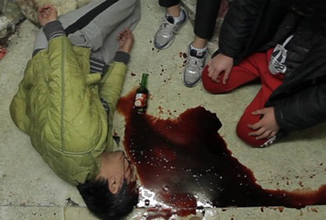 |
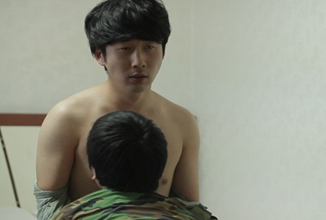 |
Step forward Lee Sang-woo - a director whose work in general can not only be described as having realism utterly inherent to it but whose narratives also underline that realism to the nth degree, no matter how dark, hard-hitting and controversial they may (and do) become, in the process - and with this highly original take on the spy/espionage genre he not only banishes the aforementioned problems but also almost rewrites the rule book entirely:
'Dear Dictator' begins with a camera panning around the streets leading to, and through, the main political buildings in Pyongyang, North Korea, to finally settle on a statue of 'Eternal Leader' Kim Il-sung presiding over the populous, and without further ado we are suddenly transported to the South as the camera wielding interloper quizzes Buk-seong about his past and the instances that sequentially stripped his life of any possible inkling of hope for the future.
So bleak is this (ongoing) detailing through the handheld video lens that if it wasn't for a brief focus on a South Korean flag fluttering in the breeze we could almost be forgiven for thinking that perhaps we are still in North Korea; several telling (but passing) statements from the cameraman - as well as subsequent scenes visually contrasting the young men's poverty stricken, shanty town existence against the affluent, neon lit streets of the nearby metropolis - soon making the terrible truth of their situation in the South all too clear.
For here we have an entire South Korean community shunned and ignored by its own country, left to survive, or not, on nothing but sheer will of endurance - the desperate situation used by a number of the shanty town inhabitants to almost excuse (and indeed used as an excuse) for actions that in normal society would be utterly unacceptable. Whether those actions are wholly the result of "desperate needs, desperate measures" (and questionable decisions borne of a last ditch grasp for hope) or if they are just blinkered justification for putting oneself above all others is, of course, never overtly stated one way or another - for example, whether Han-soo's mother is happy to allow her daughter to be raped by the church pastor because she believes it will confirm her willingness for religious sacrifice and thereby somehow lead to an easing of her and her family's future, or if her shocking decision is just the result of misplaced religious zealousness and self-serving evangelism - but that in itself allows a further thought provoking layer to be added to the entire narrative proceedings, for each and all of the main characters.
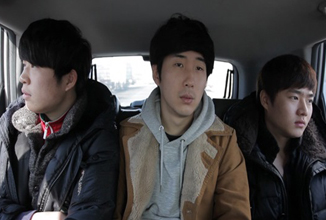 |
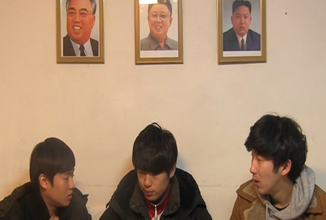 |
Lee Sang-woo's films regularly focus on characters situated on the very edge of society, often detailing taboo and/or deeply bleak lives and subjects, as well as providing no holds barred critiques of Korean societal ills.
As such, his decision to include a North Korean spy character filming the barely human existences of the shanty town dwellers is an utterly inspired move - giving a documentary feel to a great deal of the film (thereby further increasing the aforementioned realism, accented by the use of an incredibly sparse musical score); gradually unveiling the spy's true agenda by means of the documenting of the ongoing painful lives of the main South Korean characters; and giving a wholly believable reason for the detailing of a shocking tale of people living without hope, the likes of which many in normal society would prefer to believe do not exist.
The conclusion of 'Dear Dictator' even subtly asks if we can truly believe anything we see in the media on either side of the divide and thus will likely provoke a myriad of thoughts lasting far beyond the film's end credits.
Summary:
Even for those familiar with director Lee Sang-woo's earlier work, 'Dear Dictator' is bleak to a level that is never an easy watch, in any respect. However, this is a deeply thought provoking narrative that needs to be told; being a highly original take on the spy/espionage genre, in the process.
|


